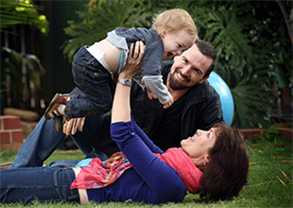Search

News & Events
Vaccination timing essentialWe all know how important it is to vaccinate a child against harmful diseases but vaccinating a child at the right wrong age can cost lives.

News & Events
The Kids Research Institute Australia researcher awarded support fundingA Kids Research Institute Australia researcher has been awarded $10,000 from the New Independent Researcher Infrastructure Support (NIRIS) award.

News & Events
The good oil on immunisationAs a new parent or parent-to-be, you will be faced with many important decisions about your health and the health of your child, including immunisation.
News & Events
Time running out to prepare for flu seasonPeople are being urged to ensure they've had their vaccination with the 'flu season expected to hit in Western Australia within weeks.
News & Events
National Indigenous Immunisation Research WorkshopYou are invited to register to attend the National Indigenous Immunisation Research Workshop 2013: lessons learnt and future directions Workshop.
News & Events
Experts gather for Aboriginal Immunisation WorkshopExperts in Aboriginal infectious disease research are in Perth this week for the National Indigenous Immunisation Research Workshop (November 7-8).
News & Events
The science of immunisation: Questions and answersCommon myths about immunisation have been laid to rest in a new booklet written by top immunologists and published by the Australian Academy of Science.
Research
Mapping Bacillus Calmette-Guérin vaccination coverage in Africa from 1990 to 2022: a novel spatiotemporal modelling studyBacillus Calmette-Guérin (BCG) protects children from severe tuberculosis and remains the only licensed vaccine for tuberculosis. Subnational estimates of BCG coverage are essential for identifying underserved populations across Africa. This study aimed to map BCG vaccination coverage in Africa from 1990 to 2022.
Research
Prevention of rheumatic heart disease in New Zealand: High-dose subcutaneous benzathine penicillin is cost-saving compared with traditional intramuscular injectionsAcute rheumatic fever is a preventable condition that can lead to chronic illness and early death. Standard prevention with 4-weekly intramuscular (IM) benzathine penicillin G (BPG) injections for ≥10 years may be associated with poor adherence. High-dose 10-weekly subcutaneous penicillin injections (SCIP) may improve adherence by reducing injection frequency.
Research
Performance characteristics and potential public health impact of improved pre-erythrocytic malaria vaccines targeting childhood burdenNew malaria vaccine development builds on groundbreaking recommendations and roll-out of two approved pre-erythrocytic vaccines (PEVs); RTS,S/AS01 and R21/Matrix-M. Whilst these vaccines are effective in reducing childhood malaria within yearly routine immunization programs or seasonal vaccination, there is little evidence on how different PEV efficacies, durations of protection, and spacing between doses influence the potential to avert uncomplicated and severe childhood malaria.
